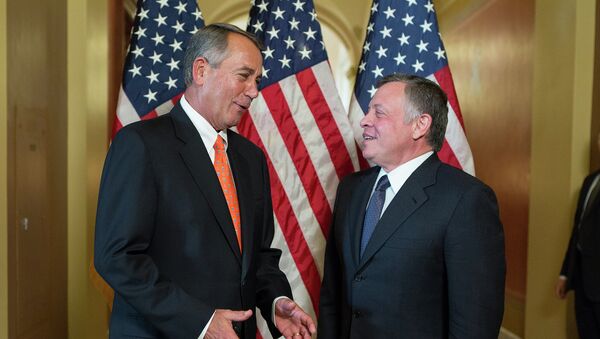The recent meeting of Arab States in Jeddah held in September resulted in Jordan's decision to join the US-led anti-ISIS coalition along with Egypt, Iraq, Kuwait, Lebanon, Oman, Qatar, Bahrain, Saudi Arabia and the United Arab Emirates.
However, although Jordan is trying to maintain loyalty to the U.S and the Gulf countries at a diplomatic level, the country is very cautious about taking any real action. Jordanian authorities, conscious of threats to security, are vehemently opposed to sending troops to Syria or intervening in any kind of conflict abroad.
“In 2005 when the US was fighting Islamist extremists in Iraq, Jordan kept neutral and stayed back,” Raed Omari, a senior contributor to Al-Arabiya told Sputnik News. “And yet the extremists penetrated Jordan and bombed three of the largest hotels leaving more than 60 people dead and hundreds injured. We definitely do not want this scenario to happen again.”
Omari adds there is a limit to such pacifism, however.
“We have no troops in Syria, but should the extremists on the Jordan-Syrian border intervene in our country our troops will go regardless of permission from Syria and the U.S.,” he said.
Crisis inside
Jordan's geography traps it amidst dangerous environments — the rising waves of extremism in the south from Tunisia to Libya and the Sinai Peninsula at the Red Sea near Aqaba, through the radical Islamist revolts in the North and the East across Iraq and Syria.
While Jordan tries to stay “in the middle” in the international arena, the government may be overlooking growing tension inside the country. Extremists have been able to take advantage of internal conflict slowly seizing Jordan including growing anti-monarchy sentiments.
“More and more people do not want the monarchy anymore,” said local taxi driver Fatih. “The government does not provide any social support and there is no free education in Jordan anymore. We have a very limited social package; people outside of Amman are building their own anarchy”.
That movement now appears in confluence with the movement for a more extremist state. At the border city of Aqaba (just some 200 miles from Amman), anti-monarchy opposition members have adopted the ISIS flag as a symbol of protest against the King’s regime. Additionally, more than 2,000 Jordanians have joined ISIL.
“We are definitely experiencing a growing number of Salafi extremists movements across the country,” Omari said. “They are gaining more support day-by-day.”
Contributed by Olga Malik.




